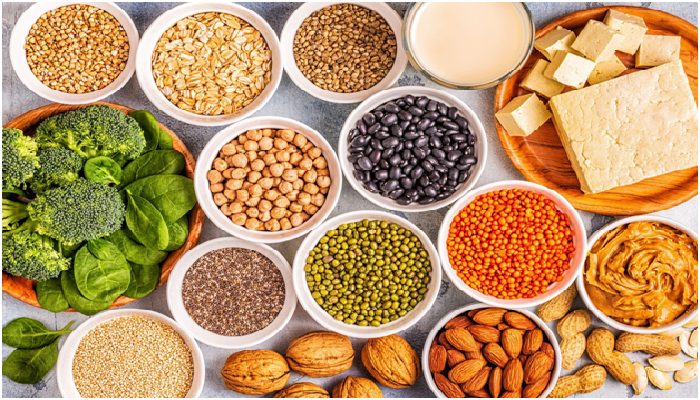Plant-Based Protein Powder and The Key To A Healthier Lifestyle

Diet and exercise are integral components of staying healthy. As we age, our bodies tend to change—and not always for the better. A healthy diet, exercise, and regular doctor’s visits become increasingly important as we age. Taking care of your body is just as important as taking care of your home. You wouldn’t go without homeowners insurance, so why would you deprive yourself of an easy way to remain healthy? You wouldn’t. Supplementing our diets with vitamins, protein powder, and other healthy foods (like flaxseed, for instance) can help us as we age. Good and proper nutrition should be first and foremost on your mind as you age. Better nutrition is good for your body, staves off diseases, reduces blood pressure, improves heart function, and can reduce the risk of ailments such as type 2 diabetes. Eating right with a balanced diet (a mix of carbs, fats, proteins, vitamins, minerals, and plenty of water) can improve life quality and make you feel wonderful. Unfortunately, it can be challenging to eat right all the time. Various environmental factors, health history, or lifestyle changes might alter the way you can eat. Fortunately, protein powders—especially those derived from plants—can offer a healthy alternative and supplement to aid in getting some much-needed protein into your system on a daily basis. Indeed, plant-based protein can be the key to a healthier lifestyle. Here’s how.
What Makes Up Plant-Based Protein
So, let’s take some of the confusion out of the concept of plant-based protein by defining what they are and where they come from. Plant-based proteins are derived from plants. Natural plant proteins come from nuts, seeds, beans, and legumes. Peas, soy, chickpeas, almonds, hemp, chia seeds, and peanuts are all natural sources of plant proteins that are often made into different types of protein powders. Certain vegetables and fruits—like brussels sprouts, avocado, and asparagus—also offer some protein (and their accompanying amino acids) to help bolster the protein intake of those who regularly eat plant-based proteins. Plant-based protein powders
Why Eat Plant-Based Protein?
In addition to being delicious and healthy, plant-based protein is a sensible choice for anyone who follows a predominantly vegetarian or totally vegan lifestyle. There is a significant difference between animal and plant protein. Think about it this way: animal proteins are complete proteins. This just means the meat contains all essential amino acids for a healthy diet. Most plant proteins aren’t complete, so you’ll need to supplement a few things to get all the amino acids you need. That said, plant-based protein can be a part of a very healthy diet. It lowers the risk of stroke and heart disease. It’s more sustainable. It’s sometimes better for the environment. Above all, it’s delicious! Complete proteins can also be found in foods like Quinoa, soy, eggs, and dairy products in addition to the usual meat suspects. So, supplementing a plant-based diet with foods such as whole grains, beans, veggies, and nuts is useful for getting the rest of those amino acids into your diet. Plant-based protein powder can also be a great supplement—and since it’s available in a variety of flavors, it offers a delicious and convenient alternative to other sources. Another major perk of using plant-based proteins is that some of them function as a digestive aid—but your mileage may vary depending on your health and how your body responds to certain foods. Another fantastic benefit of plant-based protein is protection against cancer, type 2 diabetes, stroke, and heart disease. These ailments occur less often in people who eat a high plant-based diet.
Increased Fiber Intake
Beans. Lentils. Peas. Soy. All of these plant-based proteins aren’t just delicious and easy ways of getting enough protein in your diet. They’re also a wonderful way to enhance your fiber intake! Fiber is incredibly important. Fiber regulates how your body uses sugar—and it’s super important for staying regular! Most adults need anywhere from 20 – 30 grams each day, but let’s be honest: most of us don’t get nearly that much. An abundance of processed, easily accessible, low fiber foods means many of us often neglect this integral dietary concern. Fruits, whole grains, vegetables, and other whole foods can help. It can be challenging to add more fiber to your diet, but snacking on some plant-based protein can go a long way toward helping improve your intake of this essential nutrient!
Metabolism Boost
Metabolism—the process our bodies use to convert the food we consume into the energy that sustains us—varies from person to person. Proteins control metabolism. Everything the body does is in accordance with some metabolic process. Metabolism breaks down proteins into amino acids. Plant-based proteins boost your metabolism, making it easier for the body to do its thing. Amino acids, fats, and sugars all act as energy sources when the body needs them. The endocrine system controls metabolism and it can vary greatly from person to person. Exercise and a healthy diet can help boost metabolism as well, on top of consuming more plant-based proteins.
Weight Loss
Diet and weight loss often go hand in hand with one another. Maintaining a healthy diet packed with fruits, proteins, and grains isn’t always the easiest part. But eating healthy can help with weight loss—especially when combined with a moderate level of exercise. Consider using some delicious plant based protein powder for your post-workout snack to help you build more muscle.
More muscle helps you burn more calories, which in turn helps you lose more weight! The benefits of plant-based protein are numerous, and whether you use it in protein or other forms, is a great way to feel better and take care of your health well into the future.